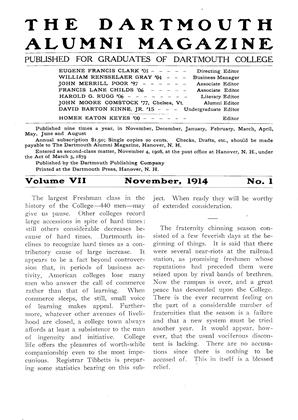— 440 men — may give us pause. Other colleges record large accessions in spite of hard times: still others considerable decreases because of hard times. . Dartmouth inclines to recognize hard times as a contributory cause of large increase. It appears to be a fact beyond controversion that, in periods of business activity, American colleges lose many men who answer the call of commerce rather than that of learning. When commerce sleeps, the still, small voice of learning makes appeal. Furthermore, whatever other avenues of livelihood are closed, a college town always affords at least a subsistence to the man of ingenuity and initiative. College life offers the pleasures of worth-while companionship even to the most impecunious. Registrar Tibbetts is preparing some statistics bearing on this subject. When ready they will be worthy of extended consideration.
The fraternity chinning season consisted of a few feverish days at the beginning of things. It is said that there were several near-riots at the railroad station, as promising freshmen whose reputations had preceded them were seized upon by rival bands of brethren. Now the rumpus is over, and a great peace has descended upon the College. There is the ever recurrent feeling on the part of a considerable number of fraternities that the season is a failure and that a new system must be tried another year. It would appear, however, that the usual vociferous discontent is lacking. There are no accusations since there is nothing to be accused of. This in itself is a blessed relief.
The real test of,the season is, however, yet to come. Initiations may not be held until the second semester, and then no freshman may be initiated who has not twelve hours to his credit. What proportion of their candidates will the fraternities be able to pull through? That which is on trial is now not so much the system of chinning, as the the whole fraternity system; its general influence, its reason for being. The revelation will occur in February.
The Alumni Council will meet in Philadelphia, November 13 and 14. This year, as last, the sessions of the Council will be held at the Bellevue Stratford Hotel which will be the general Dartmouth headquarters. The hotel management has particularly requested that all those wishing accommodations at the time of the Dartmouth-Pennsylvania game and the Council meeting should make early application.
THE ALUMNI MAGAZINE enters upon the present year far more fully organized than ever before. Professor Eugene F. Clark will continue to exercise general oversight of make-up and will be responsible for the assembling of special articles. Professor Francis Lane Childs will assume charge of the department of College News, and Mr. Harold G. Rugg will devote attention to reviewing alumni publications and to keeping track of faculty activities. Mr. Comstock will pursue his able direction of the department of Alumni News. The undergraduate point of view, will be presented by Mr. David B. Kinne, Jr., of the class of 1915. Mr. Kinne is editor of The Dartmouth and has had considerable journalistic experience with New York and Boston papers. The staff thus enumerated is able, conscientious, and well balanced. THE MAGAZINE should, in such hands, go far toward realizing the ideal of a college review.
It is not likely that Dartmouth men will ever know another David Cross. Great measure of years may be given to others: the undimmed memory that can span almost a century may again be granted. But with these things is scarce likely to be combined the marvellous affirmative vitality of body and mind which Judge Cross possessed; the keen interest in contemporary events, the ready sympathy and understanding that made him one with the aspirations of youth; the unswerving, enthusiastic loyalty that rendered personal friendship with him a high privilege, and that, bestowed upon his almamater, thrilled him, and all those who encountered him, with an almost sacred fervor.
His hold upon the imaginations of Dartmouth men was extraordinary. In him they saw the personification of Dartmouth tradition. When he spoke they crowded to hear him; and hung, spellbound, upon his eloquence. Those who were present at the alumni meeting in June will long treasure the memory. Ninety-seven years of age, Judge Cross took the platform to urge a resolution for a tablet in memory of Francis Brown, President of the College during the Dartmouth College Case. In fulness of voice, in clearness of enunciation, in vigor of gesture, few men of middle life could have equalled him. As for the phraseology, the rhythm of successive periods, the melody of noble words set to a genuine and lofty emotion, no living orator could have approached him. A life-long admirer and student of Webster, in that last public speech of his, in which he eulogized a career in which Webster played so vital a part, Judge Cross seemed filled with
A few words next day at the alumni luncheon, and the public career of David Cross was closed. His summer was one of failing strength. In October he ceased to live, and from far and near came alumni of his College bringing their personal tribute of love and of grief.
 View Full Issue
View Full Issue
More From This Issue
-
 Article
ArticleADDRESS DELIVERED AT THE FUNERAL OF JUDGE CROSS OCTOBER 5, 1914
November 1914 By Ernest Fox Nichols -
 Article
ArticleADDRESS DELIVERED AT THE OPENING OF COLLEGE – SEPTEMBER 24, 1914
November 1914 By Ernest Fox Nichols -
 Class Notes
Class NotesLOCAL ASSOCIATIONS
November 1914 -
 Class Notes
Class NotesCLASS OF 1841
November 1914 -
 Article
ArticleA NATION-WIDE DARTMOUTH NIGHT
November 1914 -
 Article
ArticleFACULTY CHANGES
November 1914









